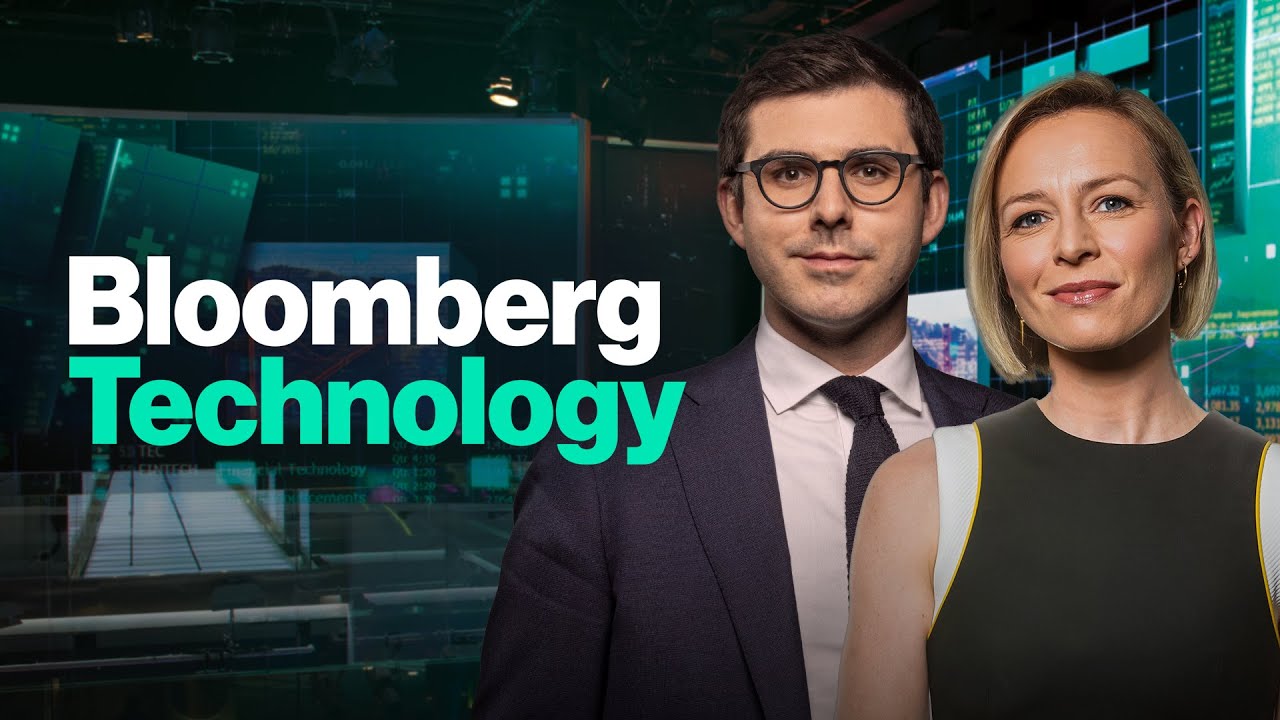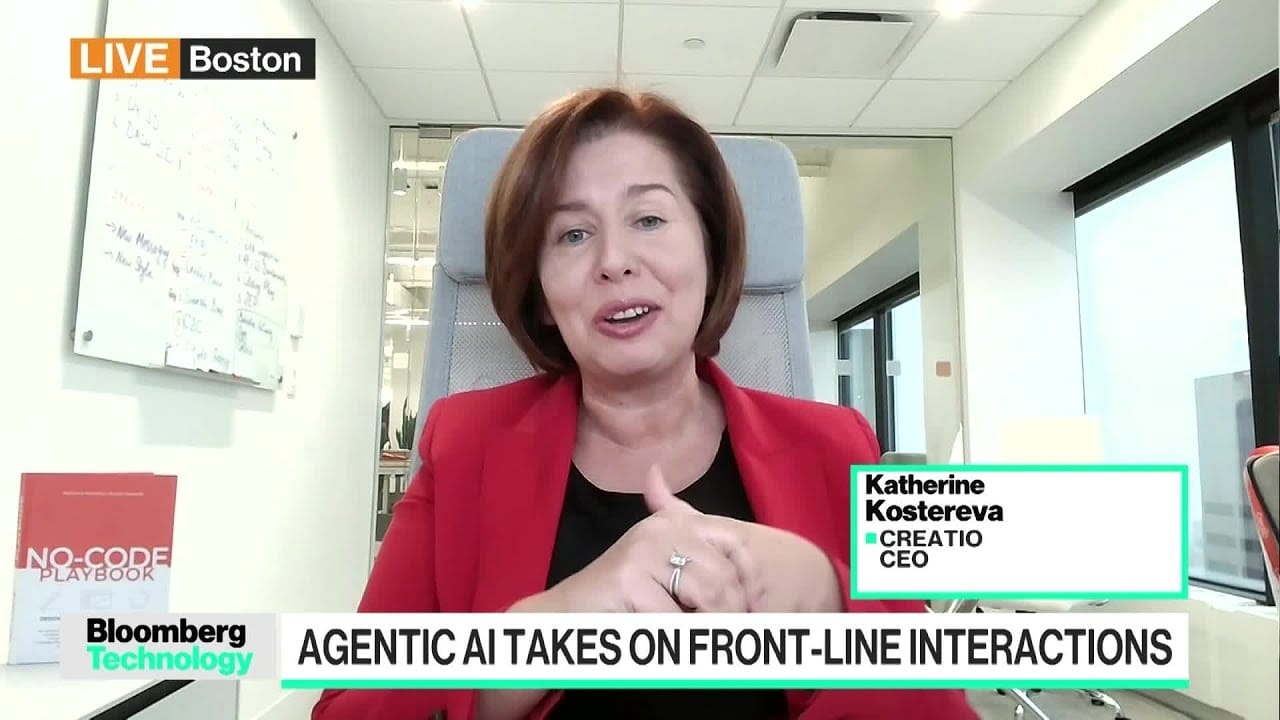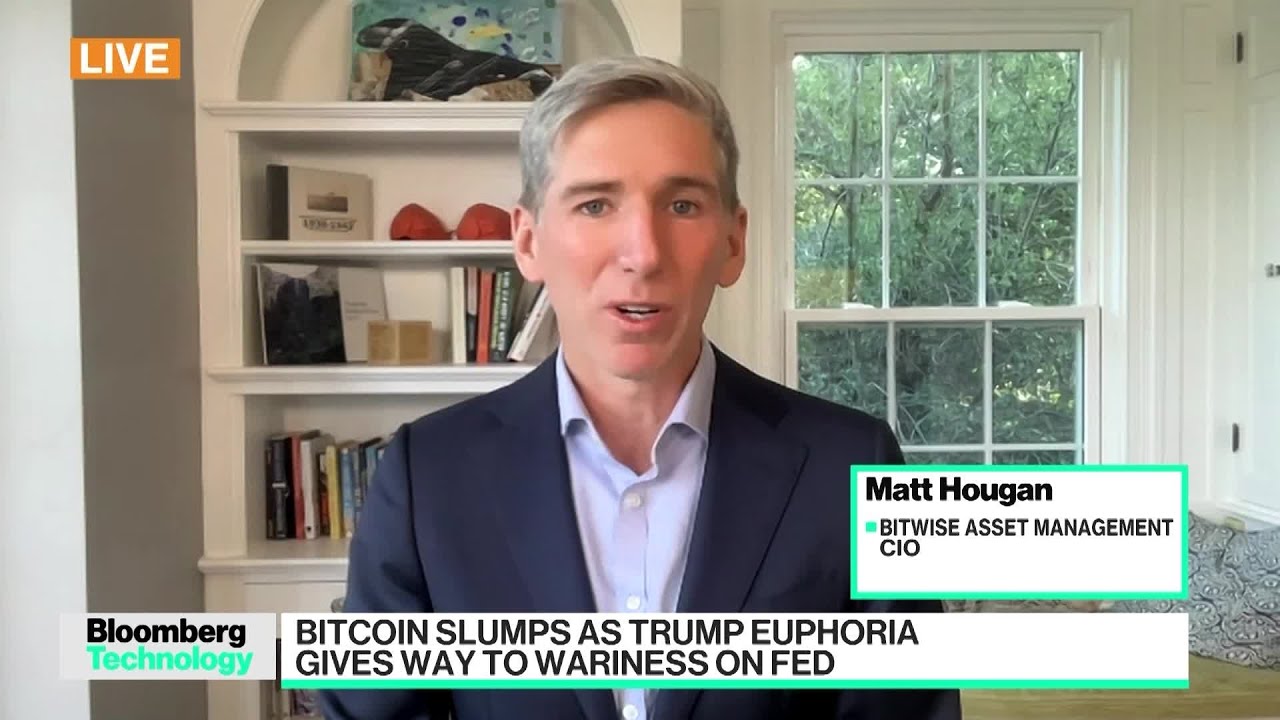Bloomberg Technology
‘Bloomberg Technology’ 10/28: Facebook Is Now Meta
The only daily news program focused exclusively on technology, innovation and the future of business from San Francisco. ——– Like this video? Subscribe to Bloomberg Technology on YouTube: Watch the latest full episodes of “Bloomberg Technology” with Emily Chang here: Get the latest in tech from Silicon Valley and around the world here: Connect with…
Published
3 years agoon
The only daily news program focused exclusively on technology, innovation and the future of business from San Francisco.
——–
Like this video? Subscribe to Bloomberg Technology on YouTube:
Watch the latest full episodes of “Bloomberg Technology” with Emily Chang here:
Get the latest in tech from Silicon Valley and around the world here:
Connect with us on…
Twitter:
Facebook:
Instagram:
From the heart of where innovation money and power collide. In
Silicon Valley and beyond. This is Bloomberg Technology with
Emily Chang.
Welcome back to Bloomberg Technology. I’m Emily Chang in San
Francisco. Coming up in the next hour out with the old and in
with the mayor. Mark Zuckerberg goes all in on the metaverse
doubling down on immersive reality and rebranding the entire
platform even changing Facebook stock ticker. We’ll talk about
all of it with MIT US Global Business Group vice president
Nicola Mendelsohn this hour. Plus Apple and Amazon plummeting in
late trading. Amazon projecting holiday sales that fell short of
estimates indicating a pandemic boom for e-commerce could be
over. Meantime Apple iPhones and Macs falling short of estimates
along with fourth quarter revenue. We will break down all the
results. And big tech bands together to build a more diverse
workforce. We’ll talk exclusively with the chief diversity
officers of SNAP Uber and Spotify to talk about a new plan to
make workplaces more inclusive across Silicon Valley and the
global tech industry.
But first the social network that we’ve all known as Facebook
for the last 16 years now has a new name. And it is mega CEO
Mark Zuckerberg announced the name change during the company’s
Connect conference. Take a listen.
This is the most definitive signal yet of its ambitions to focus
on virtual reality and the metaverse over the next 16 years.
Will the new name distance the social network from the onslaught
of criticism that it prioritizes profit over people are at.
Ludlow has been outside headquarters of the company now known as
Metta in Menlo Park California. An ad you saw that same change
happened that big change right there over your shoulder.
Yeah. Nine seconds off to talk about it. Stop speaking. They
just ripped off the canvas and that was the new science. So
clearly they’ve been thinking about it for a while. A change of
name the same corporate structure no change to the Facebook
properties including Facebook Messenger WhatsApp and Instagram.
That will remain. But is the biggest signal yet that Facebook
will now matter is staking his future on the metaverse. And
naturally one of the bigger changes is that the stock taker will
change from SB to NPR s on December 1st.
All things being equal. This is not just about gaming. They
revealed this new Oculus headset and a range of use cases which
were fitness and health. A big surprise with virtual health
fitness classes gaming of course a new grand theft auto for
virtual reality but also business. Mark Zuckerberg said this
would be big for the economy but also big for the environment.
Imagine a situation where instead of flying across the country
for a meeting you both where your Oculus headset and your one on
one in a virtual space. So that is the vision that Mark
Zuckerberg outlined. But he was candid.
This will take a decade at least before it has mass reach. Emily
Chang. All right. As Ludlow thank you so much. A little later
we’re gonna be speaking with Nicola Mendelsohn vice president of
Matters a global business group right here on Bloomberg
Technology. Want to take a look now at how investors reacted to
this news. Hour critic Gupta joins us with the details. Kitty
how did the market take it. Well Emily Facebook shares positive
on the day but let’s take a little bit of a step back here and
put this into perspective because it’s been about two months of
really share pressure two months where Facebook has been trying
to deal with those of course Apple advertising talk about growth
concerns. And of course that whistle blower testimony. What I
really want to point out though is what this new move to the
metaverse essentially is going to do to its bottom line.
Twenty seven billion dollars that’s how much they’re expected to
jump in costs in 2022. And just for some perspective.
That’s actually one quarter of Facebook annual revenue. So going
to potentially hit their bottom line for this longer term
investment like at Ludlow talked about. I want to hit those
earning stories though because Facebook isn’t the only mover on
the day we have Apple earnings and Amazon earnings let’s kick it
off. With Amazon down four point three percent after hours
putting a poor holiday sales forecast attributing some of that
to supply chain concerns but also the fact they’re going to have
to hire even more delivery workers. And that’s going to cut into
their profits. So missing estimates on that front and really
taking it on the chin. There are now four point three percent
after hours. It was down almost 6 percent after hours. Looks
like it’s paired some of those losses. Let’s get to Apple though
because that seems to be the big story dragging down its entire
supply chain. Looks like Skyworks and Broadcom have paired those
initial gains but they were down or when the headlines first
came out. And this coming after Apple also missing on their
total revenue their iPhone revenue and their Mac revenue. What
did well though Emily it was there iPod revenue. So the question
here is do you start to see them come back up going into the
holiday season. And what does this look like regionally. China
seem to be the out performer but the rest of the world not so
much. All right Kristie thanks for that. I want to stick with
Apple results and bring in Julie. Ask a Forester research. Julie
what’s your takeaway. You know obviously all companies all
retailers dealing with a lot now supply chain issues but with
you know makin an iPhone sales missing that’s kind of a big deal
right.
So I don’t think it’s a bit I don’t. So I think certainly Missy
is missing your expectations missing investor expectations that
Apple still grew in double digit growth. They continue to
deliver double digit growth year in and year out. I don’t think
anyone stressed about Apple. I think if we look at most of Apple
sales still come from hardware. While yes most of consumers over
90 percent of consumers may own a smartphone or a computer only
half on a tower maybe a third of the smart speakers smartwatch.
There’s still a lot of upside for Apple on the hardware side.
Certainly Apple’s target audience tends to be a fluid. They’re
going to be less price sensitive. They still have a lot of
confidence that we’re about to go into the holiday season which
is one of the biggest seasons of the year. Apple is doing really
well to bring consumers and sell into their ecosystem sell
services. Their marketing is very sophisticated. And I think
certainly if we look at you know according to Forrester 44
percent of consumers are very concerned about the values of
those brands from whom they buy. I think Apple stores really
well there as well. So I don’t I don’t think anyone’s worried
about Apple even if they’ve missed expectations of this quarter.
Tim Cook on the call right now saying demand was very robust
despite supply constraints. Does that mean you’re not concerned
about supply constrained. I mean we’ve we’ve reported that Apple
could cut production of the new iPhone by as many as 10 million
units.
Yeah. So I think there’s certainly some risks like the
semiconductors our rare supply chain is a risk. As you talked
about the cost of labor whether it’s in stores or for delivery
is certainly a risk. But I think we’re also talking to me
getting within Romaine Bostick we’re talking about a company
here that they may be missing expectations they may not sell as
much as quickly but it’s still a very strong company that
continues to perform amazingly well you know throughout the pen.
With or without a pandemic we’re still at home working. We’re
still at home with education. We’re still at home the streaming
media and apple selling goods and services and all the places
that consumers are buying today. Meantime sales in China almost
doubled to 15 billion dollars. What do you make of that.
So why would people not an expert on the Chinese market. I do
think that Apple does a better job as one company selling
devices selling services whether it’s pain or its music its
media its entertainment. They do a better job of bringing
consumers into that ecosystem keeping them there and yet
worrying about the lifetime value of a customer is very high for
them. And that’s something that I think the Android ecosystem
doesn’t compete very well with. So I think that would be one of
the reasons. All right Julie ask a forest to research. Thank you
so much for joining us and weighing in. Meantime a story we’re
continuing to watch and that is Activision Blizzard. CEO Bobby
Kodak has asked the company’s board to cut his compensation
until the videogame maker meets its gender equity goals. Kodak
made more than one hundred fifty four million dollars last year
most of it in stock awards. His new compensation would be a
little more than sixty two thousand dollars. Last week
Activision failed to convince a California court to temporarily
halt a sexual harassment and discrimination case against the
company.
If we all work at it within the next decade the metaverse will
reach a billion people host hundreds of billions of dollars of
digital commerce and support jobs for millions of creators and
developers.
Mark Zuckerberg is all in on the metaverse at its Connect
conference. Facebook unveiled Horizon Home an addition to the
Oculus quest to virtual reality headset. But its biggest news is
of course a total rebranding. Zuckerberg unveiled the company’s
new brand name brand new name I should say. We talked to Metta
Global Business Group vice president Nicola Mendelsohn about the
company’s game plan next. This is Bloomberg.
It is time for us to adopt a new company brand to encompass
everything that we do to reflect who we are and what we hope to
build. I am proud to announce that starting today our company is
now.
There we have it. After weeks of speculation Mark Zuckerberg has
made it official. Rebranding Facebook to Metta decoupling its
corporate identity from the social network mired in controversy
over its toxic content and highlighting a shift to an emerging
computing platform focused on virtual reality. Zuckerberg called
the metaverse the next frontier. And on December 1st the
Facebook stock ticker will be changed to end the IRS literally.
To better understand this big shift we are joined by Nicola
Mendelsohn vice president of Met US Global Business Group.
Nicola thank you so much for joining us. Just a few hours ago
you were a company. Just a few hours ago you worked at a company
called Facebook. Now it is mad at you are even changing the
stock ticker. And even Google didn’t do that. Given that the
vast majority of the company today doesn’t work on the metaverse
at all why take this risk.
Well first we didn’t see it as a risk and we’re just coming off
a company all hands. And the excitement at the company is very
real and metal really captures where a company is going. And
also the future that we want to build. But our mission hasn’t
changed. Metis Focus is all around building the metaverse but
continuing to let people connect to find communities to grow.
Businesses in the way that they have with the Facebook family of
apps over the almost 20 years that we’ve been going. And it
really reflects and also solves the confusion that I think there
has been out there caused by a company named sharing the same
name as well as our biggest app. And as I said you know Facebook
started as a single app and now we’re a whole family of apps and
services with Instagram and WhatsApp and so many others. And
matter actually brings together all of these apps all of these
technologies under one new brand new company brand. Give us some
color on what the Horizon marketplace looks like. Is it going to
work like an app store. Will there be a subscription model.
How will people make money in this new world. Oh lots of
questions. So her first stop with Horizon.
Well that’s the social platform that we’re going to be building
for people to create and interact in the metaverse.
So with Horizon Worlds well that’s where you can build worlds
and you can jump into them with your friends with your family
with your colleagues and to discover new places that you might
want to go meet together in or play games in or get to know
different members of your community with different avatars that
you might have. An horizon home is really our early vision for
the home space in the Metaverse and Horizon work rooms which is
already up and running. Is that the collaboration. And you know
I was just in the meeting last week and that feeling that you
when you’re sat round a virtual table and especially in this
world today where we’re all working in a much more hybrid way
it’s very different just from having a one on one straight into
the screen like you and I are doing now. You actually feel like
you’re sat around the table. You do turn left. You do time
right. Depending on where the audio is coming from. So it’s a
very different audience. It’s an enhanced if you like social
experience.
But what if the metaverse and are in VR don’t make the world
more social at all make us more disconnected more antisocial and
replicates so many of the criticisms that face Facebook today.
Well that’s not the case from the experiences that I’ve already
been enjoying and already having it in. You know when I’ve been
into the when I’m playing games or actually when I’m meeting I’m
hanging out with people. So I’ve been to the moon. That’s
probably the first person that you’ve got is saying I’ve been to
the moon with my colleagues and we took with our avatars.
Virtual SD against the get back drops of the sun and backdrops.
But I think also at the heart of your question also as well is
as making sure that we’re addressing and building responsibly
for the metaphors. And I think there’s a couple of things here
that are really important to point out. One is that no one
company alone is going to be building the metaverse. Many
different companies many different developers businesses are
going to be building together. What I do think that is important
is that we’re building in the principles of safety and security
right in from the start. And that if we have these principles
right as a society then we’re going to be so much better at
tackling the new challenges that inevitably come along with new
technologies as and when they arise. The Facebook files Nicola
have revealed some of the ills of social media that Facebook
knew internally. But from the public’s perspective it appears
you did not act on that. Instagram was toxic to teens. That less
than 5 percent of hateful content was taken down its Facebook.
Taking a longer look in the mirror right now or running away. Or
are you committing to double down and take some accountability
for these issues.
You know what we’re seeing right now is a coordinated effort to
selectively use leaked documents to paint a false picture of our
company and it really doesn’t in any way reflect the company
that I know and that I’m passionate about and that I love
working about. And I’m actually really proud of our record.
Navigating these complicated tradeoffs involved in operating in
a services of scale. And I would say look at the actions that
we’ve taken. Look at the considerable investments that we’ve
made. If I just take this year we’re on track to spend more than
five billion dollars on safety and security. And I think that’s
more than any other tech company. Even if you adjust the scale
and the fact that we now have 40000 people that are working on
safety that are working on security for the company I think
shows that we’re not running away that we absolutely understand
the responsibilities that we have. I’m against the different
areas that you could look at. You can see that the progress that
we’re making across all these different areas. But you’re 40000
people serving three billion users. So there’s this question is
Facebook just too big to cover. And there may be so many smart
and well-intentioned and capable people who work there but can
you moderate every political moral and religious issue in every
single country and every language around the world. Or is that
just impossible for any one company to do.
So one of the things that we’ve set out to do is actually set
out and be very open and transparent about the work that we’re
doing in this area. And so that’s why we now publish four times
a year. The Community Standards Enforcement Report and we’re
even opening our books to E. Why as an independent auditor to be
able to validate and look at our results. Now I think this is
some of the most comprehensive most sophisticated work that is
going on anywhere around the world. And I’m really proud of that
work.
But to your question we’re not satisfied if there’s anything on
our platform that could in any way cause harm to somebody. And
so we’re committed to continuing to get it done off of our
platform. We might not be able to get everything done but we
absolutely are committed to do everything we can to make those
numbers as small as possible. Meantime Facebook score ad
business remains the engine of growth for now. We’ve seen
Facebook and Twitter and SNAP take a hit as a result of the
Apple ad tracking technology changes. Apple’s reporting its
earnings results today. They actually missed estimates for
fourth quarter revenue. But I’m curious if you have any words
for Apple right now as somebody who is so influential in
Facebook I or I should say matters ad business. Now we’ve we’ve
been wanting for a long time about Apple’s ISE 14 policy and the
fact that really it’s been benefiting Baron bottom line at the
expense of small businesses and at the expense of creators. And
I think we’re seeing that play out now especially with small
businesses where you know they have really small budgets. And
for these small budgets to work they’ve got to be able to reach
the customers that matter to them. And especially over the last
year we’ve seen how vital it was for small businesses to be able
to you know if they weren’t able to open their shops to be able
to reach out and find the customers that matter to them. And at
its heart we do believe that privacy and advertising can
co-exist.
But without the collateral damage caused by Apple.
There’ve been questions about Mark Zuckerberg continuing role at
the company and I’m curious if there’s any indication he might
step back as CEO move into a solely chairman role like we saw
Larry and Sergei do at Google. And similarly for Sheryl Will.
Will she
take on a different role or take a step back if the ad business
is less important than the metaverse.
Nobody is saying that the ad business is less important at
Facebook it is an important part of how we of how we do
business. And I wish you could have seen me be the all hands
that we just came off that both Mark and Sheryl were on. And the
excitement that was emanating from not just Morgan’s show but
all of our leaders at the company sharing the vision exploring
it having fun with that with all of our employees and really
toasting towards this next vision for the company over the over
the decades ahead. So as somebody who is so critical critical in
running the global ad business I’m curious what is the ad
opportunity that you see in the metaverse. How effective do you
think ad targeting will be there. And tell us a little bit more
about your own experience and what you think advertisers will
get out of this.
So I think there’s gonna be a lot of exciting opportunity for
for advertisers but I think first and foremost there’ll be a lot
that just happens in the metaverse for free as there is on the
Internet today but there will be advertising opportunities. But
the way that we build all of our products first and foremost is
that we start with people. We start with people. And we make
sure that you know and understand how people are using and
enjoying our products. And then and then we go from there. I
think there’s going to be opportunities for creators and we’re
going to make sure that we’re building the tools that both
creators and developers need in order to help them be successful
in the metaverse as well. So I think there’s a lot to be excited
about. I’m already seeing businesses you know starting to
explore what it’s like to actually experiment with augmented
reality. So I think about the fact that you can go on Instagram
today and you can try on virtually a pair of rape glasses in the
Rayburn Shop or Charlotte Tilbury where you can try makeup on
and lipstick. So already seeing brands start to start to have
fun with it now. Nicola you’re having lots of conversations with
advertisers every day. And I have to ask you are they concerned
about the social media onslaught. Are they concerned about the
claims and revelations of the whistleblower. Francis how.
Because the critics wonder how any advertiser right now can
justify advertising on Facebook platforms. Yeah. So I’m having
what I would say is very thoughtful and considered conversations
with advertisers. And what they’re acknowledging and what
they’re seeing is the thoughtfulness of the approach the
investments that we’re making and the considerable progress that
we have been making over the years. They recognized how the how
the conversation has been taken out of context. They recognize
why it’s right for a company to do research about its products
to understand how to constantly improve them. And they
understand that. And they think that’s an important part. And
they also see our commitment to the work that we do with
organizations like Gombe and on the MRC as well. And that’s
where we stand by and is really important to us. All right
Nicole Mendelson from Matter I almost at Facebook Nicola joining
us on a late evening in London.
Thank you very much for joining us and sharing the new vision.
We’ll be back with more of Bloomberg Technology after this quick
break.
A few other stories we’re watching Mark Cuban’s basketball team
the Dallas Mavericks is having a giveaway for fans but it is not
your typical bobblehead or tee shirt freebie. The Mavericks have
announced a five year partnership with Voyager Digital and fans
that sign up with the cryptocurrency trading platform in the
first 48 hours will get one hundred dollars in free Bitcoin.
And Microsoft is getting back into the personal computer game
business. The maker of the X box video game console has come out
with age of empires for the first installment of the series in
16 years. The Microsoft executive in charge said If you want to
speak to gamers you have to go beyond the console and speak to
PC gamers as well.
Coming up Shopify six year earning streak comes to an end. After
the break I’ll speak with the company’s president about what he
needs to get that back.
And Apple CEO Tim Cook is speaking on the earnings call now.
Take a listen to what he had to say about Apple TV. Plus
in just its first two years Apple TV plus has already proved
itself to fans around the world. And I want to congratulate the
incredible actors writers storytellers producers and everyone
else who’s behind the scenes work has made that success
possible.
Welcome back to Bloomberg Technology AM Emily Chang in San
Francisco and to get back to tech earnings are critique. Gupta
has been following all of the reports coming out Kristie. Take
it away. Well Emily after hours let’s just kick it off with
Facebook. They did report earnings but they did have a major
change in name now called Meta. You are seeing four shares up 1
1/2 percent intraday after hours about flat. But it’s really
Amazon Apple that’s taking the cake because they both missed
their earnings estimates up. Amazon I should say actually
putting a lower than expected holiday forecasting the supply
chain costs and those labor shortages are going to affect their
holiday numbers. And they also have Apple of course missing on
total revenue iPhone revenue and Mac revenue. Only their iPad
revenue was up. So of course both those stocks under pressure. I
want to hit from big tech in the US too big tech in Canada
because Shopify also reported their earnings today and they
actually missed their estimates. But the stock ended up higher
by 7 percent on the day. And it was all because analysts said
well yeah they missed their earnings but they also have this
major long term potential and you can kind of see that year to
date. That has really been the sentiment because Emily not only
is shop of a higher on the day it’s higher on the year by this
year higher on 20 21 outperforming the Canadian benchmark which
is the largest member of but also outperforming Apple Amazon
Facebook and even the S&P 500. Emily. All right Kristie thanks
for that. I want to stick with Shopify and its rare earnings
Miss Talk. Joining me now president of Shopify Arlie
Finkelstein. OK Hala it had to happen at some point but why did
it happen now. Well look I think just let’s just level set here
for a second I think we are sort of in this new normal post
pandemic. But I don’t think there’s anything average about what
Shopify and merchants are building. I think that 2020 will
forever have an asterix by it in history books. But as things
begin to settle into sort of this new post pandemic trend our
merchants and shop they’re growing at an extraordinary speed.
Emily it took us 15 years for the merch our merchants to get to
two hundred billion dollars of GMV GMV and just 16 months double
that GMV was up 35 percent for the quarter 41 billion. When you
look at revenue we hit one point one billion in revenue up 46
percent. So what we are seeing is more merchants come into
Shopify. They’re launching more merch and getting larger on
Shopify and they’re taking more of our services. And I think
what is becoming clear in this new world is that we are really
building the essential Internet infrastructure for commerce and
we expect Q4 to grow substantially faster than the retail sector
overall. OK. How is the supply chain issue challenges that seem
to be smiling everyone. How. How is that affecting Shopify and
all of the businesses that rely on you. Yeah. So we did not see
a material impact from supply chain. We saw that inventory
levels and delivery times had not changed materially from Q3
last year to this year. What I would also say is on the supply
chain it seems like every single year the small businesses and
the merchants that you Shopify they seem to always face these
new challenges whether they’re you know things like the pandemic
or a supply chain in this case. And what we noticed is that our
merchants are really really good at being resilient.
We also have a very diversified merchant base across verticals
geographies channels and many of those soaps source locally and
have room in their margins. To absorb some of these shocks you
have to sort of remember that most of the merchants on Shopify
they use the direct to consumer model which we think is going to
be the mainstay in retail. They’re not like these big box
retailers operating on razor thin margins. And so when you
combine the fact that a lot of them do have a direct
relationship with the end consumer. A lot of the make their own
products.
We have not seen a major slowdown. Now that being said if supply
chain does become a long term issue I think merchants will need
Shopify more than ever before to find efficiencies to go direct.
I’d mentioned on the call earlier today that we saw brands like
Loxley Tan and Moody and Spanx and Dockers and Tupperware and
FTD 100 year old flower company all signed up for Shopify this
past quarter. We’re seeing them go direct more in a way they
haven’t they haven’t done in the past.
Shopify is a huge partner of Facebook now. Mehta What do you
think. What do you think of the new name the Metaverse Future
and how influential will Metta be in the future of commerce.
Look Facebook has been an amazing partner to us. I actually kind
of like the new name. I think I know there’s some people are
unsure about it. I think it’s a great name I think and it better
articulates what they’re at least what I saw today and their
developer conference what what they’re planning.
The key for us though is that we do.
We believe that the future of retail is going to be retail
everywhere. We think it’s going to be online offline. We
announced a partnership a week ago with Spotify. Now we’re
embedding commerce right into Spotify. So artists who are also
entrepreneurs can sell more easily. We’ve a partnership with
tech talk but when Facebook launched Messenger we were the
launch partner for commerce for the launch partner for Instagram
Commerce. And on Facebook we’re now putting Shopify pay into
Facebook for both shop merchants and non Shopify merchants. So
if the metaverse is a place where shopping happens and commerce
happens we’re really fortunate that Facebook has has been
incredibly he’s been a great partner for us over the years and
we suspect we will be the launch partner for commerce inside of
Facebook. Or better. Harley Finkelstein president of Shopify
thank you for joining us. All right. I want to go to Amazon now
lower in after hours trading after giving a forecast for holiday
sales that fell short of estimates. New CEO Andy Jassi warning
that supply chain issues could cost the company several billions
during the busy holiday shopping season. Joined now by Melissa
Burdick co-founder and president of Parkview an e-commerce
platform that helps companies like Amazon with ad sales and
Intel. And of course she used to work at Amazon for many years.
What do you what’s your take on this this holiday quarter. And
is the pandemic e-commerce boom over.
Is the e-commerce boom over. It’s the crazy growth of it might
be over but that was pretty unsustainable. And if it’s true that
there was some disappointing guidance there are so many
headwinds this quarter. There’s labor supply shortages from
warehouse refers to tech workers the need to pay higher wages.
This global supply chain issue some other things that happened
this quarter too was there was no big tent pole that so they
pulled prime day from Q3 to Q2 and June. And then the other
thing and talking to some brands was there was a higher return
to store shopping this quarter as well. So more vaccines and
people actually went as you go to shop in stores. Go figure. So
is there anything there.
Is there anything that Amazon can do to deal with the supply
chain issues. You know especially in the shopping season. And
how do you expect them to weather. You know obviously you know
we’ve seen Amazon weather many challenges. But but this one in
particular seems like a hard one.
What Amazon does so well is their third party marketplace. And
so they use the third party merchants to be able to fill in
selection. And that’s where some merchants may have issues with
supply chain but not everybody does. They have the biggest
marketplace. And so these sellers can fill in selection gaps.
And that’s one of their secrets to success. And then if you need
something you can always buy an Amazon gift card if you can’t
find what you’re looking for. Okay. Well that was my next
question is should we as customers temper our expectations for
what we can get this holiday season. Should we start buying now
for our friends and family.
That’s what everyone’s been saying. Amazon started Black Friday
deals on October 4th. So I think what we’re going to see is just
kind of constant deals throughout the quarter. People buying
holiday gifts. And that’s really what the industry has been
saying is if you wait to the last minute like many people do
every year you may not be able to find that especially in
consumer electronics and toys.
All right. Melissa Burdick CAC co-founder and president thank
you for joining us. Coming up calling for more diversity in
tech. We’re going to be joined by diversity equity and inclusion
experts from SNAP Uber and Spotify to talk about their latest
efforts to lay out a roadmap of how we create a more inclusive
tech industry. That is next. This is Bloomberg.
Well the number one word is ambition. We’re not where we need to
be. About 120 countries have put in new commitments to 2030.
About 70 of those are improvements. But we are not going to get
under current plans to where we need to get to which is a
halving of greenhouse gases by 2030. So it’s great that more
than 100 heads of state are coming. They need to raise their
game. Some have already raised it. Others need to do so. Phase
out s front. President and CEO Andrew Steer there with a dire
warning ahead of the COP 26 U.N. climate change conference in
Glasgow. You can catch more of that interview on this edition of
Bloomberg Technology tomorrow.
More diversity in tech is needed sorely. As we all know a
collective action needs to happen now.
This is according to the new report.
Action to Catalyze Tech or ACT brought by 29 leading diversity
equity and inclusion experts from academia and the tech
industry. They call on tech companies to commit to action to
solve systemic inequality in technology which they say is an
industry wide challenge that must be tackled by working
together.
For more on that I want to turn to our panel. I’m joined now by
NIKKEI vice president of Diversity Equity and inclusion at SNAP
Bo Young Li chief diversity and inclusion officer at Uber and
Travis Robinson global head of Diversity Inclusion and belonging
at Spotify.
Thank you all so much for joining us.
I’ve been looking forward to this conversation. I want to start
with you.
You are all part of a group of companies that’s now banding
together to improve diversity in the workplace. How exactly will
you at various different companies be working together. Donna.
Well essentially what the ACT report does is sign a stop to
taking collective action. Because you know we win or lose DTI
diversity action inclusion together in products quite often or
with the tech products we create we win or lose on our own.
That’s not the same with the eye. And you know chief things
really strike me. I’ve spent two decades A.I. five years in
tech. And these are the two things. First the tech industry has
failed on the ISE. And second I’ve seen with my own eyes a
passionate committed clever people in the tech industry that
really want to change. So the actual core is full and it lays
out a roadmap for that change. It shows us how we can all come
together and also adds a bit of inspiration. If people want to
know the answer to the question that the expert group spent one
year answering how to transform the ISE in the tech industry
it’s applicable to all industries then I hope they’ll check out
the report. Meantime you’re all competitors and the war for
talent is brutal. Poaching from a limited talent pool is a huge
problem. And I wonder Travis why align yourselves rather than
trying to get all that diverse talent on your own. Sure. And I
think it’s an opportunity for us as a system we can impact
change. The more we come together the more opportunity we can to
attract and recruit individuals into these amazing opportunities
here at Spotify. We just announced our work from anywhere a
program where we are democratizing the access to opportunity
beyond the major cities of New York Los Angeles or London. You
can work from anywhere. And we believe that this is one angle
and one opportunity that we believe that talent that are all
across the globe can get into tech. So we’re trying to identify
ways across with our partners. Unknown though we believe
together we can come together to increase the not only the
attraction to the tech industry but also democratize and develop
ways for us to increase access into different opportunities. So
the mindset of this distributed first workplace that is the way
of the future and for us to think about different ways of
working. The only way that’s going to be possible is we if we
come together as an industry to be able to solve this problem.
And I believe that’s what the ACT report helps us to.
So tell us more about what your companies will commit to doing
specifically to boost the talent pool and open up access.
Absolutely. So I think at the core of this and it’s spelled out
in the four recommendations in the ACT report really is it’s
about both modeling and incentivizing that inclusive talent and
the leadership. And we are all going to share what we are doing
to incentivize RTX. How are we modeling it. We’re going to
operationalize it. And I think at Uber we’ve we’ve demonstrated
that we have been able if you look at our pay equity which we
published in our annual People of Culture report Uber has been
able to achieve pay equity for the past three years without
making any major substantive changes. And that’s because we made
changes in our in our hiring process in our development process
as well as our promotion process and then sharing DNA data.
Again
it’s so important for us to be able to be really transparent
about where we’ve made progress but also where we failed. It’s
only in that transparency that we’ll all learn together. And
then finally it is really about you know and Travis really
talked about this. It’s expanding the pool because right now we
are all trying to get our unfair share of a very limited pool
because there still is a lot of stereotypes that prevent us from
seeing talent in other avenues. And so it’s about investing
growing that pool of talent. And that’s the only way we’re going
to address the underlying challenges within the tech industry. I
wonder what discussions you’ve had with your CEOs about this
report and about these issues for example. Have you talked to
Evan Spiegel. You know is he committed to making DNR DTI a chief
company business imperative. And what do you expect from him.
Yeah absolutely. I mean this whole initiative actually came
about as a result of a comment he made to me because I was
saying hey look here isn’t the plan. And you know in many of
these rich transfer strategies we will have. And it’s about you
know how to get more inclusive workforce product culture. I said
to him the thing is no one leader no one company can solve this.
Right. So if we really wanted to do it right this needs to be
across industry approach. He was like well then that should be
the strategic priority. So we actually start from that
conversation.
We come to this at SNAP from a position of complete humility. I
mean you know our point is we don’t have all the answers but if
we are to ask the questions together that’s the way we’re most
likely to find success and accelerate what has been agonizingly
incremental progress. Because to the earlier points we have to
address some of the root problems at the moment. What we do is
play like divesting musical chairs. That’s kind of like the best
we say the West is. We’re just preaching each other’s like my
best. I hate that phrase. You know I mean and at the end of the
day we have to expand the actual pool of that talent itself by
addressing educational inequities and other systemic barriers.
Well and as you say there’s a huge disconnect between what
executive thinks executives think about their workplace and what
workers think about their workplace. For example research found
that 75 percent of exacts believe that women and ethnic
minorities feel a sense of belonging in their organizations.
That belief is actually only shared by 24 percent of women and
underrepresented minority employees.
Travis how do you start addressing this. Yeah that’s a great
question. And the research shows and even in this in this
current state you have to think about connectivity and community
building when it comes to this sense of belonging. It has to be
intentional and you have to shift mindsets and behaviors. And as
I mentioned that this is paramount to what this this coalition
of individuals are coming together to address. The old way of
doing things is no longer the way of the future.
So we have to come together to think strategically about how do
we establish community in a distributed first workplace
workplace but also be intentional in realizing the data shows
that individuals from the historically excluded communities are
having a different experience. But are all first starts with the
data and that will help us think about strategies and solutions.
But once again if we come together it can accelerate the
diversity it can infuse the inclusion and be able to amplify
bonk belonging in a meaningful way. And the only way to do that
is actually be intentional with the steps that that it takes.
You know one of the big advancements in the last decade is
companies reporting their diversity statistics.
But sadly when you look at those statistics the numbers don’t
move that much every year. Sometimes they even backtrack. So
what’s it going to take to see real change. Is it going to be
years. Is it going to be decades. Well I hope it’s not decades.
I hope it is. It is years. And you know Ruba is a really great
example of a company that actually has been able to make
progress since 20 19. We’ve seen it over 10 percent increase in
women in leadership. We’ve almost doubled the representation of
underrepresented people of color in our leadership as well in
the last two years. But what it will take is not just simply
putting simple bandages and putting in programs so to speak.
It’s about fundamentally redesigning the culture that exists
within tech. You know Emily you wrote a book a few years ago
Brad Stone talking about the fact that the tech industry culture
is really defined by this very like hyper masculine culture. And
that is not welcoming. It doesn’t create along for women for
people of color LGBTQ people with disabilities. And so one of
the things that’s really important that I think this group of
tech companies is we’re saying we’re going to work together
we’re going to find solutions together and we’re going to truly
address the underlying cultural elements that makes it so hard
for people like all four of us to feel like we fully belong.
That this is our natural home in the tech industry. Well I hope
it doesn’t take decades either. And I appreciate you taking the
time to join us to share your work.
Very important work indeed. Luna King vice president of
Diversity Equity and inclusion at SNAP Bo Yung of Hoover Travis
Robinson of Spotify. Thank you all for taking the time to join
us.
Coming up meet Madoff. Facebook changed its name after a live
virtual presentation about the metaverse and how they’re working
on it. We’ll have the latest. And as we head to break more from
the Apple earnings call CEO Tim Cook has been talking about how
the supply chain crunch has affected business. Take a listen.
This is Bloomberg
for this quarter. We think that the primary cause of supply
chain related shortages will be the chip shortage.
It’ll affect ISE. So it is affecting I should say pretty much
most of our products currently.
Let’s get back to Facebook name change to Metta and our own ad
Ludlow outside the company’s headquarters in Menlo Park
California. The New Meadows sign right over here right over his
shoulder. And Ed what’s been the reaction to Mark Zuckerberg.
Big reveal. Is it took seconds for them to whip off that canvas
and reveal the new logo right after Zuckerberg made the
announcement. Hundreds of employees have come out to take
selfies. You’ve got to remember the groundwork for this has been
laid over several quarters. We know that they’ve been ramping up
their investment in Facebook Reality Labs a division that works
on augmented and virtual reality. And they made this kind of big
announcement in earnings this week that they will ramp up CapEx
to between 29 and 34 billion dollars next year. Doesn’t was
doubling CapEx. So they’re really putting their money where
their mouth is. And what’s really interesting is all the
reaction on social media to this. Right. Some people will most
believe it’s not real but Zuckerberg was pretty candid. I felt
about how distant this is from being sort of a mainstream thing
at the end of the decade. It could touch a billion people but
we’re only talking hundreds of millions of dollars of
transactions taking place in the metaverse.
Right. But Facebook making a huge investment 10 billion dollars.
And the big question remains how is Madoff going to build the
metaverse.
The other big takeaway right was the new hardware announcement.
This next generation of Oculus for the first time during that
presentation we will understand what is actually the metaverse.
If I’m a customer how do I experience it. And they kind of
outline you know the real interesting healthcare and fitness
scenarios. Imagine doing a fitness class right.
But instead of on your peloton or using another product you’re
wearing Oculus headset. You’re seeing the people in the class
with you. But they’re virtually you know you might be on the
East Coast. I might be on the West Coast. We have the same
hardware but we’re sharing a common place. And Facebook really
or I should say Metta is going to take some getting used to
really stressed this broad use case. Right for the hardware and
the platform itself. It’s not just gaming. It’s how we do
business enterprise e-commerce interact with each other do a
business meeting. So I don’t have to fly to New York for one and
save the planet essentially was Zarqawi’s argument by cutting
the carbon footprint. So they kind of set this out but candid.
This is a long way away from being real.
I spoke to Matt as now Nicola Mendelsohn earlier in the show and
asked if this is this is Facebook running away from something
she said. Absolutely not. Do we think this is going to change
the conversation at.
This idea was first reported on October 19th. Investors have had
time to digest and they’ve been commenting that this does not
sweep under the rug. The issues around content moderation the
issues around child safety on the various platforms. And this is
a change in name only. The corporate structure is the same. The
Facebook properties are the same. How the business is run is the
same. Reid Hoffman for example told you. What does this actually
change.
We shall see. I’d love Low on the ground for us in Menlo Park.
Thank you Ed for your reporting today. And that does it for this
edition of Bloomberg Technology. Make sure you tune in tomorrow.
We’re gong to be joined by MicroStrategy CEO Michael Saylor and
Geoff Lawson CEO of Twilio. I’m Emily Chang in San Francisco.
And this is Bloomberg.
You may like
-


CASETiFY’s Travel Suitcase Unboxing
-


The gitamini is a cargo-carrying robot that follows you around | Piaggio Fast Forward | TechCrunch
-


Toyota’s humanoid robot makes longest ever basketball shot | Guinness World Records | TechCrunch
-


Call ChatGPT with your landline via a toll-free telephone number | OpenAI | TechCrunch
-


How can #Trump really secure the Southern border? | Elon, inc. #podcast #shorts
-


Google DeepMind’s Project Astra AR glasses to launch some day, but not today | TechCrunch
26 Comments
Leave a Reply
Cancel reply
Leave a Reply
Bloomberg Technology
Tech Leaders Approach Trump, Intel Seeks Altera Buyers | Bloomberg Technology
Bloomberg’s Caroline Hyde breaks down how President-elect Donald Trump and Elon Musk wield their political power as the government works to avoid shutting down. Plus, the Big Tech leader merry-go-round at Mar-a-Lago continues with Jeff Bezos the latest to try and influence Trump’s policies and decisions. And, private equity firms are competing for Intel’s programmable…
Published
2 days agoon
December 20, 2024
Bloomberg’s Caroline Hyde breaks down how President-elect Donald Trump and Elon Musk wield their political power as the government works to avoid shutting down. Plus, the Big Tech leader merry-go-round at Mar-a-Lago continues with Jeff Bezos the latest to try and influence Trump’s policies and decisions. And, private equity firms are competing for Intel’s programmable chip arm Altera.
——–
“Bloomberg Technology” is our daily news program focused exclusively on technology, innovation and the future of business hosted by Ed Ludlow from San Francisco and Caroline Hyde in New York.
Like this video? Subscribe and turn on the notifications for Bloomberg Technology on YouTube:
Watch the latest full episodes of “Bloomberg Technology” with Caroline Hyde and Ed Ludlow here:
Get the latest in tech from Silicon Valley and around the world here:
Follow Ed Ludlow on Twitter here:
Follow Caroline Hyde on Twitter here:
Connect with us on…
Twitter:
Facebook:
Instagram:
Bloomberg Technology
The Rise of Agentic AI
Creatio CEO and Founder Katherine Kostereva joins Caroline Hyde to discuss the rise of AI agents taking front-line interactions from customer service to sales, and to give her outlook for the space in 2025. She speaks on “Bloomberg Technology.” ——– Like this video? Subscribe to Bloomberg Technology on YouTube: Watch the latest full episodes…
Published
2 days agoon
December 20, 2024
Creatio CEO and Founder Katherine Kostereva joins Caroline Hyde to discuss the rise of AI agents taking front-line interactions from customer service to sales, and to give her outlook for the space in 2025. She speaks on “Bloomberg Technology.”
——–
Like this video? Subscribe to Bloomberg Technology on YouTube:
Watch the latest full episodes of “Bloomberg Technology” with Caroline Hyde and Ed Ludlow here:
Get the latest in tech from Silicon Valley and around the world here:
Connect with us on…
X:
Facebook:
Instagram:
Follow Ed Ludlow on X here:
Follow Caroline Hyde on X here:
Listen to the daily Bloomberg Technology podcast here:
More from Bloomberg Business
Connect with us on…
X:
Facebook:
Instagram:
LinkedIn:
TikTok:
Bloomberg Technology
Bitcoin Slumps: Trump Euphoria Gives Way to Fed Wariness
Bitwise Asset Management CIO Matt Hougan tells Caroline Hyde why he believes the latest weakness in crypto and Bitcoin over the last few days is a “healthy pullback” which does not take away from the asset class’s overall great run this year. He speaks on “Bloomberg Technology.” ——– Like this video? Subscribe to Bloomberg Technology on…
Published
2 days agoon
December 20, 2024
Bitwise Asset Management CIO Matt Hougan tells Caroline Hyde why he believes the latest weakness in crypto and Bitcoin over the last few days is a “healthy pullback” which does not take away from the asset class’s overall great run this year. He speaks on “Bloomberg Technology.”
——–
Like this video? Subscribe to Bloomberg Technology on YouTube:
Watch the latest full episodes of “Bloomberg Technology” with Caroline Hyde and Ed Ludlow here:
Get the latest in tech from Silicon Valley and around the world here:
Connect with us on…
X:
Facebook:
Instagram:
Follow Ed Ludlow on X here:
Follow Caroline Hyde on X here:
Listen to the daily Bloomberg Technology podcast here:
More from Bloomberg Business
Connect with us on…
X:
Facebook:
Instagram:
LinkedIn:
TikTok:

CASETiFY’s Travel Suitcase Unboxing

OpenAI’s Sora AI Video Generator First Look

Break the Bad News Bubble (Part 2) | Angus Hervey | TED
Trending
-

 Science & Technology5 years ago
Science & Technology5 years agoNitya Subramanian: Products and Protocol
-

 CNET5 years ago
CNET5 years agoWays you can help Black Lives Matter movement (links, orgs, and more) 👈🏽
-

 People & Blogs3 years ago
People & Blogs3 years agoSleep Expert Answers Questions From Twitter 💤 | Tech Support | WIRED
-

 Wired6 years ago
Wired6 years agoHow This Guy Became a World Champion Boomerang Thrower | WIRED
-

 Wired6 years ago
Wired6 years agoNeuroscientist Explains ASMR’s Effects on the Brain & The Body | WIRED
-

 Wired6 years ago
Wired6 years agoWhy It’s Almost Impossible to Solve a Rubik’s Cube in Under 3 Seconds | WIRED
-

 Wired6 years ago
Wired6 years agoFormer FBI Agent Explains How to Read Body Language | Tradecraft | WIRED
-

 CNET5 years ago
CNET5 years agoSurface Pro 7 review: Hello, old friend 🧙

Rigo Martinez
October 29, 2021 at 9:09 pm
It’s so obvious that Emily Chang is so incredibly envious of tech companies’ success and the fact that she has to see it all from the sidelines on Bloomberg. Just lol…
Arturo A
October 30, 2021 at 12:05 am
Emily Chang sucks
Arturo A
October 30, 2021 at 12:05 am
We want Chang out of Bloomberg, no more China no more Chang
Arturo A
October 30, 2021 at 12:06 am
China is the worst country on earth…Chang is Chinese
Brandon
October 30, 2021 at 12:11 am
“Safety and security” is clearly leaving out data rights and data privacy.
Brandon
October 30, 2021 at 12:38 am
DEI needs to be addressed at the top of the funnel, not just the bottom. We have to reach out, inspire and hire members of underrepresented communities.
↘️[Netpayjob.com] - Get $700 NOW
October 30, 2021 at 12:39 am
Let no feeling of discouragement prey upon you, and in the end you are sure to succeed. –Abraham Lincoln
Esla Carla
October 30, 2021 at 1:16 am
Nice Video!!! Very engaging from the beginy to the end, nevertheless business and investment are the best way to make money irrespective of the pandemic😷
Bruno Guerrero
October 30, 2021 at 1:24 am
@Luisomar Delgado Sure you can invest with her anywhere.Anyone can contact her as well.she’ll definitely respond to you.Write her on what’s app⤵️
Bruno Guerrero
October 30, 2021 at 1:24 am
@Dan Costello Sure you can invest with her anywhere.Anyone can contact her as well.she’ll definitely respond to you.Write her on what’s app⤵️
Bruno Guerrero
October 30, 2021 at 1:24 am
‡†𝟙𝟡𝟟𝟚𝟝𝟟𝟛𝟘𝟞𝟚𝟝✅✅
Bill Yates
October 30, 2021 at 1:24 am
This is the kind of info we don’t get from most YouTubers .l will get in touch with her right away, I’m really impressed.
Azrah Ekin
October 30, 2021 at 1:25 am
I saw so many reviews of this Expert Kimberly on youtube,so i texted her and she got me started with full knowledge on how to go about it,helped me out and i bought the dip😀and I’ve been making huge returns from trading.
Wesley Chase
October 30, 2021 at 1:25 am
Seeing alot of success stories,she must be honest and trustworthy to get such positive review from her clients.
Michael Do
October 30, 2021 at 3:30 am
Really thank you so much for uploading this full show. I cannot live without those full shows! Thanks!
M Jamil Hoque
October 30, 2021 at 4:11 am
If the technology industry wants to be inclusive three things need happen first.
1. The US needs to stop poaching talents from abroad.
2. The US needs to stop politically blocking other country’s capabilities.
3. Globally, other country’s should be proud and support their own individuals or organisations.
Michael Do
October 30, 2021 at 4:14 am
I like the color that Emily wears!!
Komodo OdomoK
October 30, 2021 at 4:29 am
Emily, really caught her with the question on what if the metaverse that FB is pushing actually leads to more people getting even more disconnected. Gotcha! Their sanctimony notwithstanding, FBs vision has less to do with society and more about new ways to make money. Anyone ever thought of how people can physically play basketball on a real piece of land, or play chess on the street? Maybe there is an idea there!!! Elon should send Zuck and his other Meta Trons to Mars and leave us earthlings in peace.
D-CoinVesting
October 30, 2021 at 4:40 am
Meta variant.
Knight
October 30, 2021 at 10:57 am
Facebook looking more and more like a dystopian conglomerate ran by an evil cyborg everyday
Вячеслав Гурин
November 1, 2021 at 3:16 am
Спасибо! Thank you Emily!
Shahar Rozenbloom
November 1, 2021 at 8:03 am
סוני תרשום פטנט על טלוויזיה בסירות ויאכטות עם סוני פלייסטיישן. בפטנט.
Shahar Rozenbloom
November 1, 2021 at 8:39 am
Zoom תוכל להעביר קבצים שיימחקו כמו תקליטי זהב וסרטוני פרסום עם אבטחה. באפלקציה הכי ארגונית שלה. שעולה 500$ בשנה.
Shahar Rozenbloom
November 1, 2021 at 8:44 am
Hertz Will buy Trucks from Tesla and Take Care Of Them from Engine like for State and Factories and Busses.
chavruta2000
November 3, 2021 at 6:10 am
Facebook is dead!
Simo Janahi
November 3, 2021 at 3:46 pm
They are ignoring the fact that VR headsets are not for everybody. most people get motion sickness including me. I spent a lot of money on VR and only used it once. Even my 15 year old kid doesn’t like it.